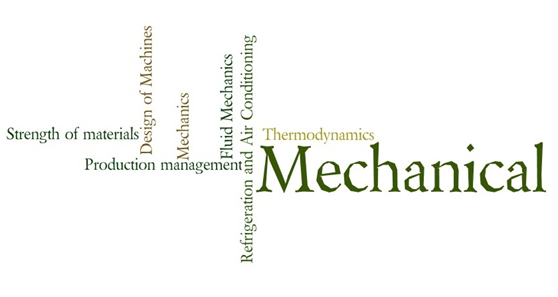

Featured AMCAT Module: Mechanical
About the Module

The mechanical module, based on the curriculum taught in the 4 years would help discriminate candidates who have only theoretical knowledge vis-a-vis someone who understands the theory as well as its application. In this module, a student is tested for his understanding of mechanical engineering concepts - theoretical and practical knowledge. Questions from different areas in this subject are asked so as to assess a student on his complete knowledge of the subject.
The module comprises of questions on all of the following mechanical engineering concepts:
Thermodynamics
It is the branch of physical science that studies the effects on material bodies, and on radiation in regions of space, transfer of heat, and of work done on or by the bodies or radiation. Mechanical engineers use thermo-science to design engines and power plants, heating, ventilation, air-conditioning (HVAC) systems, heat exchangers, heat sinks, radiators, refrigeration, insulation etc.
Strength of Materials
It deals with the ability of an object to withstand an applied stress without failure. The study of strength of materials often refers to various methods of calculating stresses in structural members, such as beams, columns, riveted joints and shafts.
Fluid Mechanics
It is the study of fluids (liquids, gases, and plasmas) and the forces on them. Fluid mechanics can be further divided into fluid statics, fluid kinematic and fluid dynamics. It is a branch of continuum mechanics, a subject which models matter without using the information that it is made out of atoms.
Design of Machines
It includes calculation and designing of all geometry parameters, tolerances and control parameters for gears, shafts and axles (static and fatigue calculations, calculations of shaft dynamic behavior), springs and torsion bars and standard springs selection. Rolling contact bearing calculation, calculation of longevity, beatings, contact stress, loss of power, heat release. Performing kinematic and dynamic analysis of lever mechanisms, to get trajectory, displacements, velocities, and accelerations and link forces is also included.
Refrigeration and Air Conditioning
It includes Refrigeration Cycle (Vapour Compression Cycle, Vapour Absorption System), refrigeration equipment (Compressors, Condensers, Evaporators, and Expansion Devices) and refrigerants, ozone depletion potential and global warming potential. Refrigeration Systems (vapour compression systems, Carnot Vapour Compression Systems, Standard Vapour Compression Cycle and Ewing’s Method for Suction State with Respect to Maximum COP, Standard Rating Cycle and Effect of Operating Conditions, Actual Vapour Compression Cycle, Multistage Vapour Compression System, Cascade Refrigeration System. Properties of Moist Air, psychometric properties, Humid Specific Heat, Wet Bulb Temperature, Adiabatic Saturation and Thermodynamic Wet Bulb, Temperature, Psychometric Chart. Air Conditioning Equipment and their applications, food preservation, cold storage, freezers, transport refrigeration is also included.
Production Management
It includes the basics of production planning and control, industrial engineering, estimation and costing. The module checks whether the student understands and can handle production environment effectively. Plant location, layout and Material Handling, work study; areas of application of work study in industry, Job Evaluation and Incentive, Production Planning and Control, Inspection and Quality Control, Estimation and Costing are also included
Tips to Improve:
- Mechanical engineers are involved in the research & design, manufacturing and maintenance of automobiles, cooling systems, buildings, bridges and industrial equipment and so it is important that they remain aware of the latest trends across different fields.
- Get practical experience if possible. Mechanical Engineering degrees are notoriously theoretical, which is good. However, the importance of getting practical experience in any area that you may be interested in can't be overstated.
- Take interest in manufacturing; part of a mechanical engineer's job is to design things so that they can be efficiently, inexpensively fabricated.
- Develop extensive reading and writing skills. Documentation and technical writing skills are a must in many mechanical engineering jobs.




